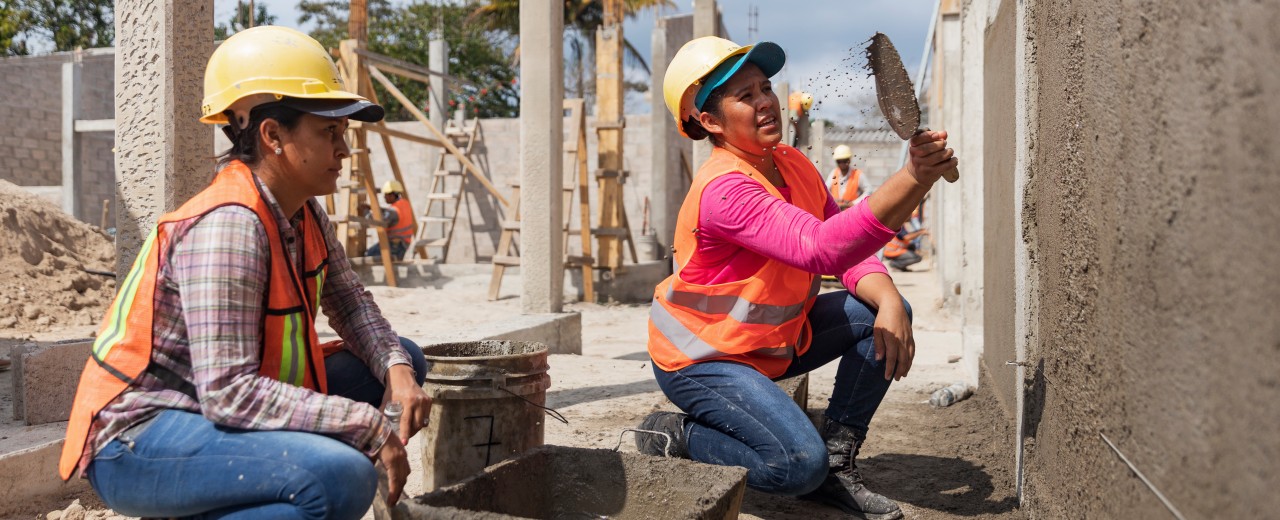
As of: 10/2024
Many schools in Honduras are in a poor structural condition and inadequately equipped, with teachers often lacking sufficient training. Schools with higher grade levels are scarce, contributing to low enrolment rates. This is especially evident from the seventh grade onwards, where school enrolment falls significantly. The situation has become worse in the wake of the COVID-19 pandemic. To address this, KfW Development Bank, on behalf of the German Federal Government, is supporting Honduras in its efforts to renovate and expand its schools. The aim of the newly constructed, well-equipped classrooms and playgrounds is to make it more appealing to attend school. Additionally, KfW is promoting the networking between schools, particularly in rural areas, to improve access to education.
With an estimated 9.6 million inhabitants, Honduras is one of the poorest countries in Latin America. Almost two-thirds of families live below the poverty line. Although around 16% of the central government’s national budget is spent on education, the funds are mainly used to pay teachers’ salaries, leaving limited funds for essential investments. As a result, schools and other education facilities are in a poor condition.
At the same time, Honduras is a very young country, with children and adolescents under 15 years of age making up almost one third of the population. School is mandatory for children aged between 5 and 17 years. However, attendance rates are particularly low for pre-schools and higher grades. School enrolment drops significantly from the seventh grade onwards. There are various reasons for this. In rural areas in particular, there is a lack of schools with higher grades and a shortage of well-trained teachers. Many schools in these regions operate with only one or two teachers for the first six grades, leading to large class sizes and insufficient attention to diverse learning needs. This negatively affects the learning success of individual students.
Other factors contributing to pupils dropping out of school include migration, poverty and a lack of prospects, especially in higher grades. The COVID-19 pandemic has exacerbated the situation greatly, with schools remaining closed for many months. The government has done a great deal in recent years to reform the school system.

KfW is supporting Honduras in its efforts to improve its education system on behalf of the German Federal Government. The project to improve infrastructure in the education sector (Programa de Mejora de la Infraestructura Escolar/PROMINE) has been running since 2012. KfW is supporting Honduras with a total of EUR 55 million in grants and budgetary loans, of which EUR 45 million has already been implemented. These funds are being used to renovate, expand, and equip existing schools. The schools promoted by the project are selected on the basis of a jointly prepared master plan that catalogues all schools in the country, their facilities, and the condition of their buildings.
Priority is given to schools that have organised themselves into networks in order to make joint use of facilities, such as school kitchens, computer rooms and school gardens. These networks consist of up to ten schools, where at least one of the schools offers seventh to ninth grade classes to all pupils within its network. Pilot projects also pro-mote the expansion of education to grades 10 to 12, focusing on vocational training. The aim here is to combat the fall in pupil numbers from seventh grade onwards. The more attractive the schools are, the more likely young people will attend lessons. KfW also supports the exchange of experiences between schools.
A municipal committee has been set up for each infrastructure project. This committee is responsible for the administration of funds as well as the construction and renovation of schools. Parents and pupils therefore have a vested interest in taking care of the buildings. Even now, after several years, the schools supported by KfW remain in a good condition. The municipal committees manage the funds very frugally, allowing for additional investments in the schools, such as purchasing extra equipment for school kitchens or installing coverings over sports facilities.
The project is highly relevant to social development in Honduras and contributes to the implementation of SDG 4 (ensuring inclusive, equitable and high-quality education and promoting lifelong learning opportunities for all) in Honduras. As part of the project, Honduras has introduced updated building standards for schools. These provide for climate-adapted architectural designs, such as higher ceilings in the hotter regions of the country.
These updated building standards have also helped to make classrooms brighter and schoolyards easier to monitor. Teachers can keep a constant eye on schoolyards and sanitation facilities, leading to fewer instance of violence. All schools are also now accessible. To date, 302 schools in 90 networks have been promoted, benefiting around 47,000 students.
The project contributes to the achievement of these following United Nations Sustainable Development Goals:
KfW Group
KfW Development Bank
KfW Office Tegucigalpa
Share page
To share the content of this page with your network, click on one of the icons below.
Note on data protection: When you share content, your personal data is transferred to the selected network.
Data protection
Alternatively, you can also copy the short link: https://www.kfw-entwicklungsbank.de/s/enzB3LYA
Copy link Link copied